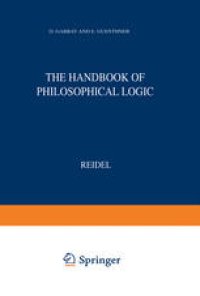
Ebook: Handbook of Philosophical Logic. Volume I: Elements of Classical Logic
- Genre: Mathematics // Logic
- Tags: Logic, Mathematical Logic and Foundations
- Series: Synthese Library 164
- Year: 1983
- Publisher: D. Reidel
- Edition: 1st
- Language: English
- pdf
The aim of the first volume of the present Handbook of Philosophical Logic is essentially two-fold: First of all, the chapters in this volume should provide a concise overview of the main parts of classical logic. Second, these chapters are intended to present all the relevant background material necessary for the understanding of the contributions which are to follow in the next three volumes. We have thought it to be of importance that the connections between classical logic and its 'extensions' (covered in Volume 11) as well as its most important 'alternatives' (covered in Volume Ill) be brought out clearly from the start. The first chapter presents a clear and detailed picture of the range of what is generally taken to be the standard logical framework, namely, predicate (or first-order quantificational) logic. On the one hand, this chapter surveys both propositionai logic and first-order predicate logic and, on the other hand, presents the main metalogical results obtained for them. Chapter 1. 1 also contains a discussion of the limits of first-order logic, i. e. it presents an answer to the question: Why has predicate logic played such a formidable role in the formalization of mathematics and in the many areas of philo sophical and linguistic applications? Chapter 1. 1 is prerequisite for just about all the other chapters in the entire Handbook, while the other chapters in Volume I provide more detailed discussions of material developed or hinted at in the first chapter.
The Handbook of Philosophical Logic is a unique systematic survey of the central areas of philosophical logic. Divided into four volumes, each devoted to a major sub-field within the disciplines, it is expected that the Handbook will have considerable influence in the field for many years to come. Written by world authorities in philosophical logic, the work reflects careful and fruitful collaboration by the authors at every stage of the project. This has ensured a comprehensive and definitive set of articles which will be of inestimable value to general philosophers, linguists, logicians, mathematicians and computer scientists. Volume I: Elements of Classical Logic, deals with the background to what has come to be considered the standard formulation of predicate logic - both as far as its semantics and proof theory are concerned. The central chapter on predicate logic is followed by chapters outlining various alternative, but essentially equivalent ways of constructing the semantics for first-order logic as well as its proof theory. In addition, this volume contains a discussion of higher-order extensions of first-order logic and a compendium of the algorithmic and decision-theoretic prerequisites in the study of logical systems. Volume II: Extensions of Classical Logic, surveys the most significant `intensional' extensions of predicate logic and their applications to various philosophical fields of inquiry. The twelve chapters in this volume together provide a succinct introduction to a variety of intensional frameworks, a discussion of the most well-known logical systems, as well as an overview of major applications and of the open problems in the respective fields. Volume III: Alternatives to Classical Logic, consists of a series of surveys of some of the alternatives to the basic assumptions of classical logic. These include many-valued logic, partial logic, free logic, relevance and entailment logics, dialogue logic, quantum logic, and intuitionism. Volume IV: Topics in the Philosophy of Language, presents a panorama of the applications of logical tools and methods in the formal analysis of natural language. Since a number of developments in philosophical logic were originally stimulated by concern arising in the semantic analysis of natural language discourse, the chapters in this volume provide some criteria of evaluation of the applications of work in philosophical logic. In revealing both the adequacies and inadequacies of logical investigations in the semantic structures of natural discourse, these chapters also point the way to future developments in philosophical logic in general and thus close again the circle of inquiry relating logic and language.